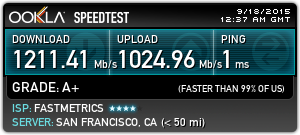Let’s face facts… your internet is probably fast enough. Oh, if you’re hosting a gaggle of teens all streaming their own shows it might bog down but most people today can get 100Mbps service to the home if they’re willing to pay, and most of the time it’s uncongested enough that you can stream what you want or download what you want.
Except, when it isn’t.
When you’re sitting there happily watching TV and your show turns into a pixelated nightmare (or even worse, starts buffering) then you probably turn to a speedtest app to see if your internet has slowed down. And then chances are you get the same numbers you always get and so you just sit there, wondering what the holdup is and why you can get such great numbers on a speedtest app and total bupkus on the stuff you actually want to download.
Speed test apps, as good as they are, are still not a realistic way of measuring your experience. They’re often hosted by servers that do practically nothing else. Now, if Netflix’s own servers had a speed test app, that might help, but it would just tell you what you already know: the problem isn’t in your house, it’s somewhere else.
So once again I ask, are internet speed tests good for anything but bragging rights?
A speed test can tell you the one thing you really might want to know, which is if the problem really is, as they say in horror movies, “inside the house.” A slow speed test might make you consider rebooting your router, checking connections or calling your internet service provider. So there’s some benefit to them. However, once you’ve determined (as you almost always do) that there’s nothing wrong at home, a speed test app is pretty useless.
I guess it’s a good thing that internet connections are so reliable that the problem is almost never in the house. It’s almost always a matter of capacity somewhere, and while that’s frustrating, at least it’s not something you personally have to find and fix. Internet service providers constantly struggle to add new capacity and new lines to meet the ever-growing demand for streaming video. It’s been estimated that up to half the nation’s internet traffic after dark is streaming video of one sort or another, and that exposes a big problem with streaming video.
As anyone who has tried to stream Game of Thrones when a new episode airs can tell you, when everyone wants to watch the same thing, the internet slows down. This is different from broadcast technology like satellite which performs the same no matter how many people use it. There are several technologies which limit the extra bandwidth needed to stream the same content to 10 million homes, but even the fanciest algorithms and distributed multicast facilities can get bogged down sometimes. It’s a fact, and not a pleasant one.
Of course, sometimes the problem is patently stupid. Back in 2014, Verizon was accused of deliberately throttling Netflix’s video streams. This article from ExtremeTech explains that Verizon deliberately routed ALL traffic into the state of California from Netflix’s servers into only half of one network switch. It was a claim they denied, but it kept popping up so often that it really seems credible. Simply eliminating the really dumb roadblocks sometimes helps immensely.
And, I guess, if you’re really angry, and you just want to know what’s going on, a speed test app will make you feel a little better. Not better enough to get over waiting for your show to stream, but … a little better.





